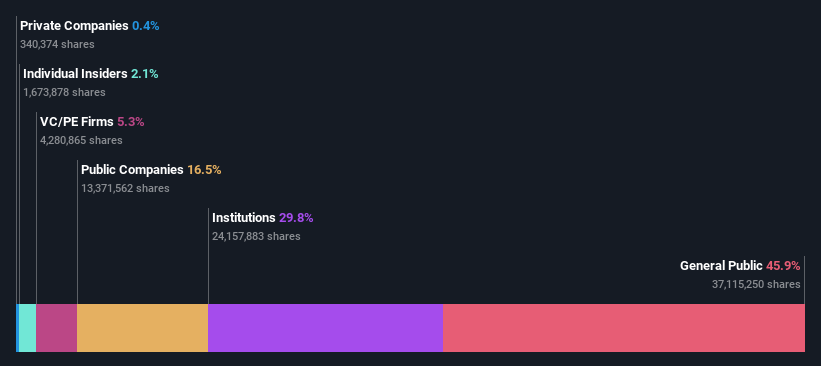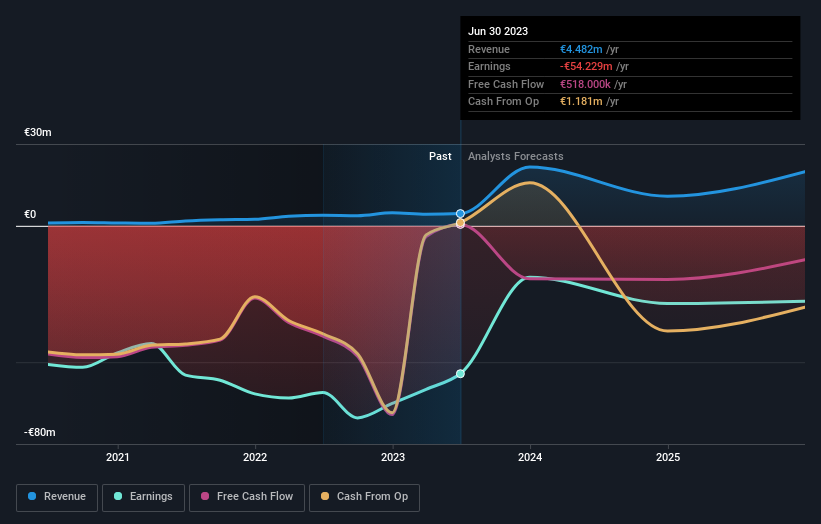- United States
- /
- Biotech
- /
- NasdaqCM:PRQR
Institutions along with individual investors who hold considerable shares inProQR Therapeutics N.V. (NASDAQ:PRQR) come under pressure; lose 10% of holdings value

Key Insights
- ProQR Therapeutics' significant individual investors ownership suggests that the key decisions are influenced by shareholders from the larger public
- 50% of the business is held by the top 18 shareholders
- 30% of ProQR Therapeutics is held by Institutions
If you want to know who really controls ProQR Therapeutics N.V. (NASDAQ:PRQR), then you'll have to look at the makeup of its share registry. The group holding the most number of shares in the company, around 46% to be precise, is individual investors. In other words, the group stands to gain the most (or lose the most) from their investment into the company.
While institutions who own 30% came under pressure after market cap dropped to US$108m last week,individual investors took the most losses.
Let's take a closer look to see what the different types of shareholders can tell us about ProQR Therapeutics.
View our latest analysis for ProQR Therapeutics

What Does The Institutional Ownership Tell Us About ProQR Therapeutics?
Many institutions measure their performance against an index that approximates the local market. So they usually pay more attention to companies that are included in major indices.
ProQR Therapeutics already has institutions on the share registry. Indeed, they own a respectable stake in the company. This can indicate that the company has a certain degree of credibility in the investment community. However, it is best to be wary of relying on the supposed validation that comes with institutional investors. They too, get it wrong sometimes. When multiple institutions own a stock, there's always a risk that they are in a 'crowded trade'. When such a trade goes wrong, multiple parties may compete to sell stock fast. This risk is higher in a company without a history of growth. You can see ProQR Therapeutics' historic earnings and revenue below, but keep in mind there's always more to the story.

ProQR Therapeutics is not owned by hedge funds. Our data shows that Eli Lilly and Company is the largest shareholder with 17% of shares outstanding. For context, the second largest shareholder holds about 6.6% of the shares outstanding, followed by an ownership of 5.3% by the third-largest shareholder. In addition, we found that Daniel de Boer, the CEO has 0.9% of the shares allocated to their name.
Looking at the shareholder registry, we can see that 50% of the ownership is controlled by the top 18 shareholders, meaning that no single shareholder has a majority interest in the ownership.
Researching institutional ownership is a good way to gauge and filter a stock's expected performance. The same can be achieved by studying analyst sentiments. Quite a few analysts cover the stock, so you could look into forecast growth quite easily.
Insider Ownership Of ProQR Therapeutics
The definition of an insider can differ slightly between different countries, but members of the board of directors always count. Company management run the business, but the CEO will answer to the board, even if he or she is a member of it.
I generally consider insider ownership to be a good thing. However, on some occasions it makes it more difficult for other shareholders to hold the board accountable for decisions.
Shareholders would probably be interested to learn that insiders own shares in ProQR Therapeutics N.V.. In their own names, insiders own US$2.2m worth of stock in the US$108m company. Some would say this shows alignment of interests between shareholders and the board, though we generally prefer to see bigger insider holdings. But it might be worth checking if those insiders have been selling.
General Public Ownership
With a 46% ownership, the general public, mostly comprising of individual investors, have some degree of sway over ProQR Therapeutics. While this size of ownership may not be enough to sway a policy decision in their favour, they can still make a collective impact on company policies.
Private Equity Ownership
Private equity firms hold a 5.3% stake in ProQR Therapeutics. This suggests they can be influential in key policy decisions. Sometimes we see private equity stick around for the long term, but generally speaking they have a shorter investment horizon and -- as the name suggests -- don't invest in public companies much. After some time they may look to sell and redeploy capital elsewhere.
Public Company Ownership
Public companies currently own 17% of ProQR Therapeutics stock. It's hard to say for sure but this suggests they have entwined business interests. This might be a strategic stake, so it's worth watching this space for changes in ownership.
Next Steps:
It's always worth thinking about the different groups who own shares in a company. But to understand ProQR Therapeutics better, we need to consider many other factors. Consider for instance, the ever-present spectre of investment risk. We've identified 3 warning signs with ProQR Therapeutics , and understanding them should be part of your investment process.
If you would prefer discover what analysts are predicting in terms of future growth, do not miss this free report on analyst forecasts.
NB: Figures in this article are calculated using data from the last twelve months, which refer to the 12-month period ending on the last date of the month the financial statement is dated. This may not be consistent with full year annual report figures.
New: Manage All Your Stock Portfolios in One Place
We've created the ultimate portfolio companion for stock investors, and it's free.
• Connect an unlimited number of Portfolios and see your total in one currency
• Be alerted to new Warning Signs or Risks via email or mobile
• Track the Fair Value of your stocks
Have feedback on this article? Concerned about the content? Get in touch with us directly. Alternatively, email editorial-team (at) simplywallst.com.
This article by Simply Wall St is general in nature. We provide commentary based on historical data and analyst forecasts only using an unbiased methodology and our articles are not intended to be financial advice. It does not constitute a recommendation to buy or sell any stock, and does not take account of your objectives, or your financial situation. We aim to bring you long-term focused analysis driven by fundamental data. Note that our analysis may not factor in the latest price-sensitive company announcements or qualitative material. Simply Wall St has no position in any stocks mentioned.
About NasdaqCM:PRQR
ProQR Therapeutics
A biotechnology company, focuses on the discovery and development of novel therapeutic medicines.
Flawless balance sheet slight.


